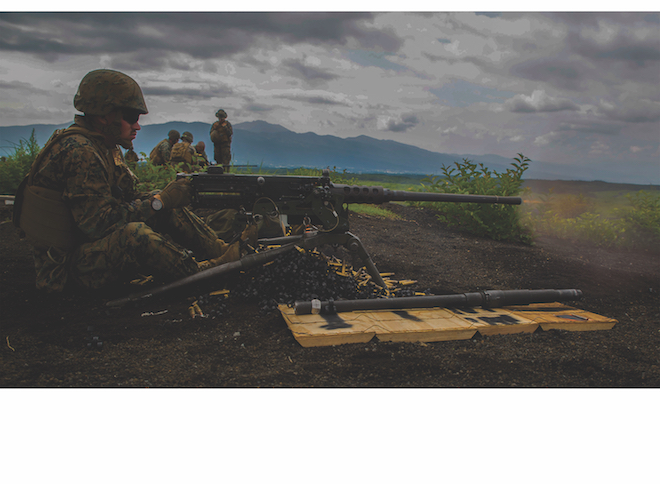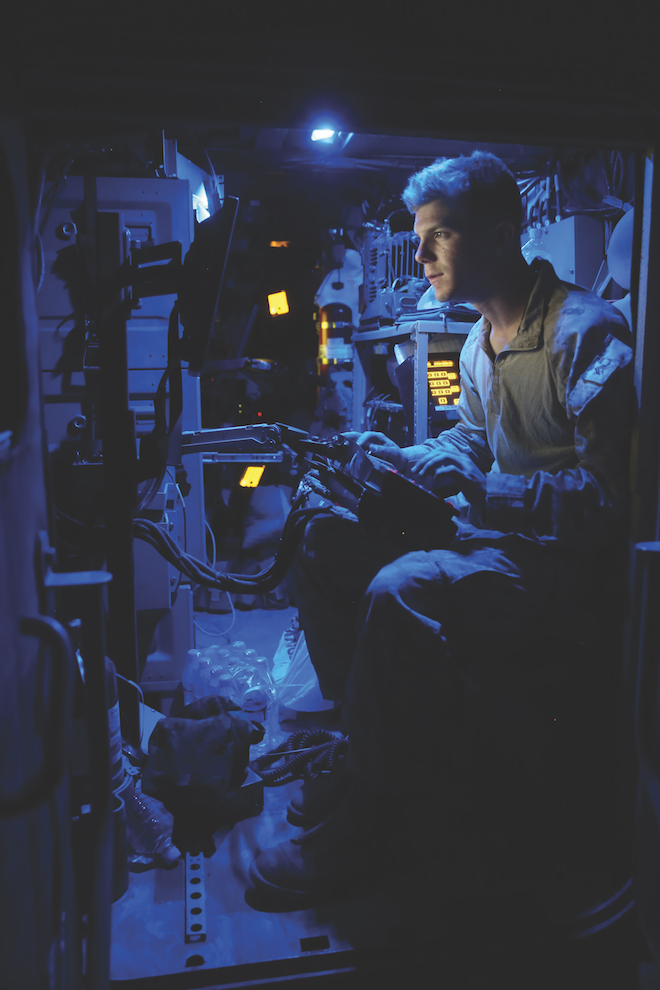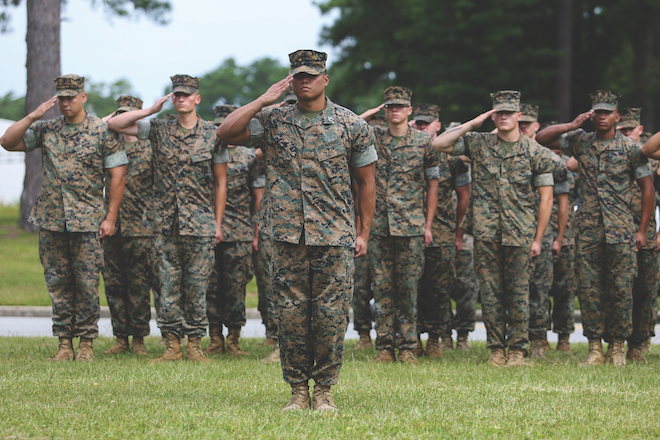
To ensure Marine Corps competitiveness in the cyber domain, personnel reforms must address policy, training, and organization, without compromising a warrior ethos.
MARINE CORPS ESSAY CONTEST—1ST PLACE WINNER (Sponsored by BAE Systems)
The Marine Corps is at a crossroads. Rapid technological change, a return to great power competition, continued asymmetric threats, and the unique dynamic of cyberspace demand a fundamental shift in talent management.
Marine Corps culture should be jealously guarded but not untouchable. Not even the rifle squad has been exempt from change. While Marines should be cautious about rushing to embrace sweeping change, the information age presents discrete challenges. To adapt to contemporary demands, the service must address an increasing institutional constraint. Cyberspace requires Marines with technical expertise to design, build, hack, and defend information systems. The private sector better attracts and compensates such talent. Even though the Marine Corps has a reputation for producing high-quality leaders and thinkers, this will not be enough to ensure the service can fight in cyberspace and blend cyber skills with traditional warfighting skills.1
Value Tradition while Adapting to Change
Marines are renowned for tactical excellence, discipline, and high standards of physical fitness. Boot camp puts young men and women through the toughest entry-level training of all the services. Following Officer Candidate School, officers undergo six months of training at The Basic School to become provisional infantry officers. These rites of passage are among the toughest military training crucibles. The transformation from civilian to Marine transcends the physical. Marine Corps Warfighting Publication 6-11, Leading Marines, describes being a Marine as “a state of mind” and not simply a “job, paycheck, or occupational specialty.”2
Every Marine is a rifleman for very real life and death reasons. As Leading Marines points out, “austerity places a premium on the role of every Marine.”3 Yet First to Fight details the Corps’ historical ability to adapt and innovate. In the first half of the 20th century, the service transformed from a naval constabulary force into an expeditionary warfighting organization capable of amphibious assault against fortified enemy shores. In fact, the concept “every Marine a rifleman” was not recognized until mid-century. During World War I, many Marines arrived in Europe having never fired a rifle in training.4
In the face of a future where the cyber domain is critical in war, it is no simple undertaking to produce highly trained cyber Marines as well as riflemen. The next generation must present a credible cyber threat to adversaries while continuing to represent “all that is highest in military efficiency and soldierly virtue.”5
It is important not to transform a legacy of excellence into rigid dogma. In the 19th century, Commandant Charles Grymes McCawley realized that to survive, the Corps would have to “adjust to the needs of a changing technology and a new social era.”6 By the early 20th century, Rear Admiral William Fullam advocated for Marines to transition from shipboard roles to amphibious landing forces. After decades of rejecting this idea from Fullam and others, the service eventually embraced a new role and mission, paving the way for victories in World War II and beyond.7
Prepare For a Cyber future
To compete in cyberspace requires an examination of Marine Corps functions and organization. The military dominates the market in lethal weapons, but the same is not true of cyberspace. At one time the military had primacy in the cyber domain, but today private firms lead nearly all dimensions of cyberspace innovation. During a recent visit to a Marine Corps unit, the Commandant offered a bonus to Marines in the audience with hacking skills. That the top Marine solicited hackers from the ranks is a stark reflection of the state of cyber recruiting, retention, and talent management in the service.8
Wars historically have been won by the force best organized, trained, equipped, and able to adapt to wartime conditions faster than the enemy. The best technology on the battlefield counts for little if not wielded by competent warriors. Tomorrow’s uniformed cyber Marines need to be just as tactically and technically proficient as today’s infantry. Close order drill was rooted in centuries of tradition and the benefits of discipline, organized maneuver, and esprit de corps.9 Now, with military operations within both the physical and cyber domains, the definition of martial strength must expand. If actions in cyberspace can shut down enemy command and control, then computer scientists, software engineers, and hackers are critical requirements.

Corporal Mark Rood, a cyber network operator from Headquarters and Service Company, 1st Battalion, 7th Marine Regiment, maintains network connectivity during a mission in Helmand Province, Afghanistan. (U.S. Marine Corps/Joseph Scanlan)
Overhaul the Personnel System
Talent management policy and process play a critical role, and Marines rightly criticize an assignment system that undervalues individual talent, particularly unique skills or qualifications. Studies have shown the manpower system drives talented people to leave the service. A 2015 survey of active and veteran service members revealed the lowest marks for job-matching, promotion, and compensation.10 Flaws can be traced back to the Defense Officer Personnel Management Act (DOPMA)—Cold War–era legislation created to standardize personnel systems across the military services and now widely believed to “waste human capital.”11 Both Title 10 of the U.S. Code and Defense Department policy further restrict service flexibility by, among other things, prescribing upper and lower promotion flow-point boundaries for mid- and senior-grade officers.12 These constraints make it difficult to adapt to cyber talent requirements.
Today’s antiquated personnel system must adapt to the information age. Revisions to DOPMA in the current National Defense Authorization Act are promising and long overdue. However, it is unclear whether the Marine Corps will take full advantage of the new authorities. Rank, time in grade, duty station, and proximity to the next promotion milestone dominate assignment decisions. The rigid and unimaginative way Marines are assigned hinders talent, strains retention, and risks mission effectiveness. The military services have some flexibility, such as with recruiting, promotion flow points, and incentive pay—opportunities that should be further explored.
For the military, fierce competition for a shallow pool of qualified personnel further complicates the critical shortage of cyber talent.13 The services are competing not only against one another, but also against private-sector pay scales.14 Only half the cyber operators needed by the military have been hired.15 Several experts have blamed this situation on the military’s longtime preference for developing officers as general managers capable of understanding and leading a wide variety of skills. This approach, they say, simply does not work in the cyber business. There can be no “cyber generalist.”16
Deputy Commandant for Manpower and Reserve Affairs Lieutenant General Michael A. Rocco has acknowledged these problems, stating a need to examine assignment policy. Greater flexibility in sequencing officer promotions may also be implemented to reward talented officers.17 The Commandant has discussed the need to improve recruiting and retaining cyber talent, urging that Marine Corps Forces Cyber Command become more like Special Operations Command—“once you’re in, you never leave.”18 Each Marine expeditionary force also has created an information group. These are important steps forward, but not enough.
Reform Personnel Policies
Many other modifications could improve cyber talent without drastically changing Marine Corps culture. The recruiting focus should be increased on computer science, engineering, software, and hacking skills, and recruits should receive a military occupational specialty (MOS) code in a relevant field. Newly commissioned second lieutenants should have the option of attending a civilian cyber graduate degree program in exchange for a longer service commitment. The Marine Corps does this already for judge advocates. And select private-sector recruits with established expertise should be granted waivers for certain training requirements.
Compensation for cyber talent must be competitive. The services can partially shape their own destiny through occupational skill bonuses or incentives by billet.19 By making use of the Assignment Incentive Pay system, the Marine Corps could add up to $3,000 per month to individual salaries right now.20
To retain cyber talent, the Marine Corps needs to offer greater career flexibility. The existing system discourages specialization and favors job rotation. Instead, cyber Marines should be allowed to opt out of the normal promotion cycle in favor of specializing. Better use of technology should be implemented for web-based talent management. Marines in cyber fields, or with skills in cyber, should be able to build online profiles with interests and career preferences, then apply to specific jobs. Monitors could screen applicants, while commands interview them. The Army Green Pages pilot program in 2012 allowed individuals to feed data into a website similar to LinkedIn. At the conclusion of the pilot, 34 percent of participants were more likely to receive their preferred job over the traditional method.21 The Marine Corps could and should pursue these changes.

Marines with the 8th Communications Battalion, II Marine Expeditionary Force Information Group attend the activation of command ceremony for the Defensive Cyberspace Operations Internal Defense Measures Company on Camp Lejeune, 16 July 2018. (U.S. Marine Corps/Tiana Boyd and Heather Atherton)
An increased focus must be placed on continuing education for Marines who design, install, hack, and defend information systems. Across the Marine Corps, there is a high degree of focus on certification and currency among the aviation community and among joint terminal attack controllers. The same level of emphasis must be placed on cyber personnel to gain and maintain credentials and certifications in their field. This requires commanders afford cyber professionals the requisite time and opportunity.
The service also should take advantage of recent legislative changes to DOPMA that strengthen merit-based promotion and allow for better targeting and retention of specific officer skills. Under the new rules, highly qualified people can become officers later in life, and reservists can more easily fill active-duty roles.22 The recent DOPMA changes also provide greater flexibility for spot promotions and less rigid promotion zones, if the Marine Corps takes advantage of them.23
At the training stage, entry-level schools also must account for the cyber domain.24 There is no military institution comparable to The Basic School. Its ability to train and educate new officers is without peer. Yet its continuing focus on the warfighting skills required of a rifle platoon commander exacerbates the urgent cyber expertise gap.
The military is always preparing for war, but kinetic conflict is episodic. There is no pause in the cyberspace conflict. Cyber forces are engaged in attacking and defending military and civilian networks every day. For this reason, continuity is critical. Constant personnel rotation introduces risk and damages operational readiness. Dr. Richard D. Hooker Jr. argued in 1993 against the one-size-fits-all generalized officer development system; instead he promoted personnel stability and recurring assignments within the same unit.25
The 2018 National Defense Strategy calls for performance at the speed of relevance. To make the vision of the Marine Corps Operating Concept a reality, expertise must be acquired that can quickly identify and counter cyber threats. Operationally, because cyberspace has sharply increased the complexity of war, the Marine Corps needs to consider the implications of a Marine air ground task force (MAGTF) without the requisite cyber talent. The MAGTF should not assume that cyber capabilities and authorities will continue to be held at the highest strategic and operational levels. Instead, just as has occurred throughout history, leading edge capabilities and the authority to use them will be delegated to lower operational and even tactical levels during conflict. Just as a MAGTF commander could not conduct integrated combined arms operations without the air component, the next-generation MAGTF must be able to conduct cyberspace operations, even if that requires a population of software developers in uniform.26 The MAGTF cannot rely solely on the joint force for cyber effects:
Cyber leaders face increasing speeds of execution and greater technical complexities inside decreasing reaction times, to make consequential decisions. If they are inexperienced, technically unaware, or unable to grasp the complexities at a system level and lack understanding of the networked structures engaged they face, they will essentially be irrelevant.27
Demand Change
Military organizations risk irrelevancy in adapting too late. In World War I, the British Navy neglected the use of mines, deeming the weapon “un-seamanlike.”28 Similarly, during World War II the Japanese disregarded U.S. antisubmarine warfare against shipping because of a perceived lack of prestige in defending the merchant fleet.29 Both decisions, based on tradition and military culture, had devastating consequences.
New threats demand the Marine Corps energize cyber talent management for a changed environment. The present age has been compared to the decades preceding 1914 and to the interwar period.30 The Marine Corps cannot afford to limit its ability to adapt and fight. To be successful, “thoughtware” for cyberspace must consist of the best and brightest talent.
1. Brian McAllister Linn, “The U.S. Armed Forces’ View of War,” Daedalus 140, no. 3 (Summer 2011), 50.
2. United States Marine Corps. Marine Corps Warfighting Publication 6-11, “Leading Marines” (Washington, DC: 1995), 7.
3. Marine Corps Warfighting Publication 6-11, 14.
4. Elton Mackin, Suddenly We Didn’t Want to Die: Memoirs of a World War I Marine (Novato, CA: Presidio Press, 1993), 81.
5. John A. Lejeune, “The First Birthday Message,” The Marine Corps Gazette, 1 November 1921.
6. Jack Shulimson, “The Transitional Commandancy: Col Charles G. McCawley and Uneven Reform, 1876-1891,” The Marine Corps Gazette, October 1988, 72, 10.
7. Brett Friedman, “The Sailor Who Fought the Marine Corps and Won,” War on the Rocks, 17 August 2018.
8. Hope Hodge Seck, “The Marine Corps Wants to Make Cyber More Like Special Ops,” Military.com, 22 January 2018.
9. Geoffrey Parker, ed., “The Western Way of War,” in The Cambridge History of Warfare (Cambridge, UK: Cambridge University Press, 2005), 1-11.
10. Tim Kane, Total Volunteer Force (Stanford, CA: Hoover Institution Press, 2017), 8-17.
11. Kane, Total Volunteer Force, 43.
12. Kane, Total Volunteer Force, 41-42.
13. Yasmin Tadjdeh, “Cyber Talent Wanted: Military, Intelligence Community Strive to Retain Cyber Workforces,” National Defense, 26 February 2018.
14. Thomas Claburn, “US mulls drafting gray-haired hackers during times of crisis,” The Register, 21 March 2018.
15. Kane, Total Volunteer Force, 37.
16. Patrick Bell and Jan Kallberg, “The Death of the Cyber Generalist,” Real Clear Defense, 11 June 2018.
17. John Grady, “Navy Sees ‘difficult times’ with Recruiting goals for Nuclear, Cyber Sailors,” USNI News, 15 February 2018.
18. Seck, “The Marine Corps Wants to Make Cyber More Like Special Ops.”
19. Kane, Total Volunteer Force, 147.
20. Kane, Total Volunteer Force, 159.
21. Brian S. Cook, “Getting it Right: Revamping Army Talent Management,” Naval Postgraduate School (Monterey, California, June 2015), 57.
22. Leo Shane III, “Here’s why the Senate wants to split Pentagon’s Personnel and Readiness Office,” Military Times, 29 May 2018.
23. Mark D. Faram, “Congress, Navy revolutionize officer promotions,” Navy Times, 22 August 2018.
24. Blaise Misztal, Jack Rametta, Mary Farrell, “Personnel Reform Lives, But Don’t Call It Force of the Future,” War on the Rocks, 9 August 2018. Brad Carson, “You Don’t Get to the NDAA Personnel Reforms Without Force of the Future,” War on the Rocks, 13 August 2018.
25. Joseph D. Hooker, Jr, “Implementing Maneuver Warfare,” in Maneuver Warfare: An Anthology (Presidio Press, 1993), 228-232.
26. Jim Perkins, “The Next New Military Specialty Should Be Software Developers,” War on the Rocks, 22 January 2018.
27. Bell and Kallberg, “The Death of the Cyber Generalist.”
28. Correlli Barnett, The Swordbearers (Cassell & Co: London, 1963), 108.
29. John T. Kuehn, “Perspectives from Great Britain, Japan, and Germany,” in H200 Book of Readings (USACGSC: Leavenworth, KS), 78.
30. Colin S. Gray, “How Has War Changed Since the End of the Cold War?” in H300 Book of Readings (USACGSC: Leavenworth, KS, December 2017), 349. MacGregor Knox and Williamson Murray, “The future Behind Us,” The Dynamics of Military Revolution (Cambridge University Press: Cambridge, UK 2001), 194.
Major Brunetti-Lihach is a faculty advisor at the U.S. Marine Corps Expeditionary Warfare School in Quantico, Virginia. He has a B.A. in history and a masters in homeland security. A career communications officer, he has completed tours in Iraq and Afghanistan.


